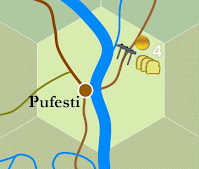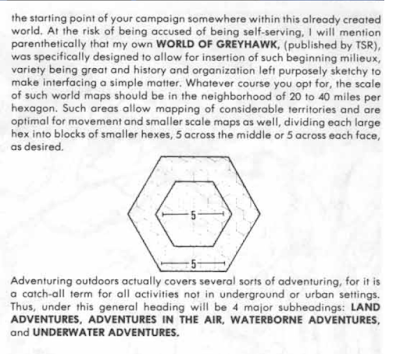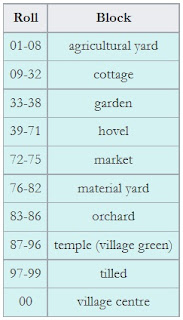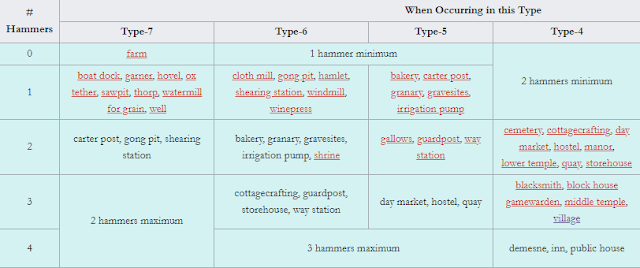Ian Danskin discussing Chris DeLeon:
"Sports and board games have rules, but video games have laws. That in soccer, you don't touch the ball with your hands because you've agreed not to, but in Fifa [vg] you don't touch the ball with your hand because it's impossible. There's no button for it. So in a sport, you can do anything that is not expressly forbidden by the rules. In a video game, you can't do anything except what is expressly allowed by the system."
In D&D, the "system" is the Dungeon Master. The DM assigns rules to things, the rules act as a guideline to the players' choices, but the player also knows that if an argument can be made, the DM can be influenced to allow something to occur that is outside the rules. If the DM allows it, the game being played is still D&D.
This is why there is no standard D&D game. This is why we get hundreds and hundreds of game and rule variations, and this is why most people's campaigns never work. The more a DM can be influenced, whether by arguments made by the players, or because a DM respects decisions and advice given by a company, the more actions are allowed. As possible actions increase, especially when those actions require little to no effort on the players' part, the more broken the game becomes. This is not a black-and-white measure. We don't have "whole" and "broken" games. We have hundreds of thousands of games incrementally occupying fractional spaces on a line between whole and broken.
Moreover, it's not just a matter of resisting influence. "What" rules a DM defends, and what arguments he or she refuses to be influenced by, changes the players' willingness to play with that DM at all; and if no players will play, again, the game is broken. So many of those fractional spaces are occupied by shitty, inflexible and wooden-headed would-be DMs.
We're not done. In my experience, the vast majority of DMs are persons who do not especially want the role — but who accept the role because of a group of people, these are the best person available. Such persons are not as committed as other DMs, and in turn are eager to maintain the support and respect of their friends ... and are therefore highly subject to being influenced. The same can also be said of many, many DMs who are simply weak people, who are needful of attention, who haven't the backbone in anything they do to stand up to the wants and demands of players with a negative answer. Negative self-assessment runs rampant through the culture; there's no reason to assume that DMs automatically fail to suffer from poor self-esteem merely because they wish to be DMs.
So, on that line between whole and broken, we may suppose (without knowing) that the median among all DMs is considerable off-center, towards broken. Given this, we may further suppose that among players, the expectation of the majority would be that DMs are, by and large, open to influence. And further that DMs not open to influence are, post hoc ergo propter hoc, bad DMs.
Logically, therefore, most players out there looking for a DM wants one that can be easily influenced, with a reasonable expectation that the player will succeed in finding exactly that sort of DM. With players wanting to influence, and DMs in turn being willingly influenced, most reports on the quality of a game are sure to be generally positive. We won't hear the words, "I push my DM around and he likes it, so the game is great," but this is essentially the dynamic.
But we are here to speak of worldbuilding. When discussing what rules a DM should embrace, we're confronted by several familiar arguments — and one of these says that the DM should be true to "reality." As it happens, "reality" is the game world, not actual reality, but this nuance is often confused by the speaker. Magic, hit points, bardic colleges, actual gods, the flail as a practical combat weapon, the presence of ring mail and many other things can be in no way confused with Earthly reality. They are, however, perfectly realistic in the framework of the game, just as it's "realistic" in Monopoly that a house can be bought and erected before another person has time to move. Or that it's equally practical to pile 60 armies on either Southern Europe or Yakutsk in RISK. Why not?
If the DM uses "real reality" instead of "game reality" as a measurement, then he or she is bound to receive lots and lots of pushback from players on the basis that something isn't "true to life" and therefore ought to be changed. Conversely, if "game reality" is made superfluid and simplistic, the DM will receive many, many suggestions from players on how to make it MORE fluid and MORE plistic. [er, sorry]
The world being built must find a path between extremes. We don't touch the ball with our hands in soccer because we deliberately want to make the game harder for the players. Of course they're able to pick up the ball. Of course, if they were allowed to do so, "soccer," or "foot-and-hand-ball," would still technically be a game ... but would it be a good game? The consensus is in that it wouldn't be. "Keep-away" is sort of a version of foot-and-hand-ball and there are no international leagues for it. I can't head down to the local community centre and sign up for a keep-away team. Nor would I want to. Nor would it make a particularly good spectator sport. The art of using a body part to do something normally done by the hands would be lost.
There is a difficulty with explaining to people who don't understand how a role-playing game works, or why it works, why certain changes will break the game. Especially any change that increases the survivability and ease of the game. When one choice is overwhelmingly better than every other choice, "choice" as a game concept is effectively eliminated. These were the problems inherent in the 3.0, 3.5 and 4.0 systems. Transforming game rules to an economic platform with a point-buy metric will always incorporate an interest in what powerful feats can be purchased most cheaply. When every character class is awarded combat actions that function like spells, then every character is effectively a spellcaster, regardless of their class title. Any single metric that's overwhelmingly used to make a system will simultaneously break the system by its lack of additional metrics. These things are obvious to professional game designers ... and yet equally tempting to professional game designers, as they save SO MUCH WORK. Designers crave fetishistically for the super-successful game that requires a minimum of effort to design. It is their Holy Grail.
Such games appear, explode in popularity, make hundreds of millions for the designer ... and then vanish as the simplicity turns the game into a boring, hated, soon-to-be-discarded thing. Anybody up for a game of Angry Birds? How 'bout Farmville?
[Yes, yes, I know, I know ... people out there play Angry Birds every day. They reach for it first thing in the morning, before getting out of bed, and get in a few last games before lights out. I know. Fuck off.]
D&D works and endures because it consists of dozens of metrics spliced together, enabling uncertain but nuanced possibilities. However, these metrics rely upon constraint, suppression and denial. Like soccer, the players need to be able to act effectively, but not easily. The combat system needs to be complex, bloated, difficult to interpret and expressly uncertain in what tactics work best against which monsters. This disallows the players a feeling of safety or surety. Of course players will hate it. Players want to feel safe. They want to feel sure. They want the game world and the rules to be immediately comprehensible and solvable. They will always argue and attempt to influence the DM in this direction. It's so predictable it's laughable.
Tell the players they must choose three weapon proficiencies. Make the penalties for a non-proficient weapon so onerous that the players will grumpily conform to the weapons they've chosen. Listen to the players groan about how few weapons they get. Listen to them hedge and haw about the cost of the weapons they really want, vs. the weapons they can afford. Listen to them refuse to get weapons they can afford, then assign this as the reason why the system sucks. Listen to them ask for more weapons. Listen to them carp about a weapon that needs two hands, that disallows a shield. Listen to them ask if they can use a two-handed weapon and a shield at the same time. Listen to them argue why that should be allowed. And so on.
But change the system to say that there are no proficiencies and that every weapon, regardless of type and form, causes 1d6 damage, and the complaints vanish. Because it's easier. Because there's no wrong choice. We've given them one choice. One choice, the "right" choice, is what they want. Not because it's really the best choice, but because they're absolutely SURE that no one else is playing the system better than they are. Or that there even is a better way to play the system.
Constraints, suppression and denial humbles the player. Multiple system metrics which deny an obvious solution humbles the player. As they should. It's not a game if you can "win" by choosing the only option. In D&D, the "lose" is conceived in the certainty players have that they're destined to choose the wrong option. Most players do not look at their list of abilities and think, "What am I able to do?" They look inwardly first, think, "What do I want to do?" — then looks through their list of abilities to see if they can do it. When that list disappoints them, they look to the DM and ask, "Even if I can't do this thing, can I still do this thing?" Whereupon the DM hears their desire, relates to the player, throws out the whole system and says, "Sure, I guess so."
If the DM says, instead, "Your character can do all these other things, why don't you try one of those?" ... the player looks at the character sheet, sighs inwardly that it's not nearly as good as what his or her imagination imagined, and grumpily say, "Well, okay I guess." The DM hears the lack of commitment. The DM knows this player shouldn't be here. The DM habitually counts the players who are here and wonders for a moment if the campaign will survive if the player leaves. The DM knows not to say any of this. Instead, the DM tries to make the player's character sheet ability sound as impressive and exciting as possible, to "win" the player over to the side of playing by the character sheet. The DM may even go as far as increasing the character sheet power by enough to impress the player. And there we are. The DM has compromised the DM.
Sometimes, I really wonder, why the fuck anybody plays this game.
On the surface, it's doomed. As a teenager, playing this game with other teenagers, I loved the way the rules came together, the way the character sheets brutally limited the player's options, the way that succeeding eventually produced more options that allowed greater successes. DMing, if a player asked to do any of the rule-of-cool dumbfuckery I hear from sites all over, I'd have laughed viciously in their face, told them "NO" in a cruel and patronising tone, and then taken steps to humiliate them repeatedly for the rest of the session by prefacing every ask of what the character did next with, "Oh, and no, you still can't do that idiotic rule-of-cool dumbfuckery." Because I had standards. Because I would rather have a player slink out in shame and mortification, with my laughter in their ears, than contribute to the regular kind of bullshit I see and read all over the internet.
You'd think with behaviour like that, I'd have trouble getting players. You'd think, with my being contemptuous and bullying, that no one would ever play with me. As it happened, the reverse was true. Instead of losing all my players, I gained more than I could handle. Because I bullied out all the riff raff, and never the serious players who wanted to approach the game as I saw it, serious players flocked to play with me. My players would hear others say, "The game I'm in is so stupid! Everyone farts around and no one gives a shit what they're doing." And my players would answer, "Fuck, man, you've GOT to come play with Alexis. Alexis is the bomb, man. He's fucking psychotic. His game is the best thing you've ever seen!"
And when I'd humiliate someone, and they'd rage quit and leave, all the other players would say, "Fuck him. Fuck that noise. Glad he's fucking gone. I take a battle axe as my proficiency."
You get the players you cultivate. I wanted to cultivate assholes like me, who loved the game, who didn't want "easy", who loved that there were fifty types of weapons to choose from and only eleven character classes. When I said, "No," they made a new plan. They changed it up. They played like their lives depended on it.
My offline players still play this way. People shout. I mind fuck them with a dilemma or a consequence and they call me names. I say I'm playing and they're always there. They tell their jobs that they can't work and they tell them why. They make time. They love it.
But they wouldn't if I made it easier. The "hard" is what makes it great.
In worldbuilding — and I guess this hasn't been much about worldbuilding — the world has to be as hard as the rules. It has to maintain a character that won't roll over and play dead. The authorities have to wield authority; the villains have to be truly spine-chilling. The monsters must be DEADLY. The world must be too big to fathom or navigate. There must be many friends, many enemies and there must be both an unease AND a certainty about which is which. The rules must be fixed and the DM should never, ever compromise about anything or any part of the game world.
So make the game world well. Make it solid. Build it to last. Build it to intimidate ... and enjoy that the players are intimidated.















.png)
.png)






